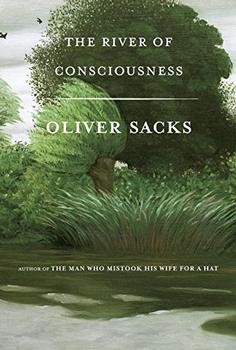
by Oliver Sacks
A collection of essays that displays Oliver Sacks's passionate engagement with the most compelling and seminal ideas of human endeavor: evolution, creativity, memory, time, consciousness, and experience.
Oliver Sacks, a scientist and a storyteller, is beloved by readers for the extraordinary neurological case histories (Awakenings, An Anthropologist on Mars) in which he introduced and explored many now familiar disorders - autism, Tourette's syndrome, face blindness, savant syndrome. He was also a memoirist who wrote with honesty and humor about the remarkable and strange encounters and experiences that shaped him (Uncle Tungsten, On the Move, Gratitude). Sacks, an Oxford-educated polymath, had a deep familiarity not only with literature and medicine but with botany, animal anatomy, chemistry, the history of science, philosophy, and psychology. The River of Consciousness is one of two books Sacks was working on up to his death, and it reveals his ability to make unexpected connections, his sheer joy in knowledge, and his unceasing, timeless project to understand what makes us human.
"Starred Review. This title gives readers plenty to think about, such as the nature of consciousness and the cultural limitations of science. Every reader should be able to find something to enjoy and appreciate here." - Library Journal
"Starred Review. Acclaimed neurologist Sacks (1933–2015) demonstrates the range of his knowledge of evolution, botany, chemistry, medicine, neuroscience, and the arts in this collection of 10 essays he was working on before his death in 2015. The book is a tribute to his appreciation of all that's beautifully complex in humans." - Publishers Weekly
"Sacks engages and deepens our attention through the historic and personal particulars with which he argues his points about what, say, memory, or forgetting, or creativity, or 'A General Feeling of Disorder,' involves organismically. So doing, he has made permanent contributions to literature." - Booklist
"A collection of dissimilar pieces that reveal the scope of the author's interests - sometimes challenging, always rewarding." - Kirkus
"An incisive and generous inquiry into human nature." - Elle.com
"Sacks's sharp intellect and observations, and passion for knowledge, shine through." - Buzzfeed
This information about The River of Consciousness was first featured
in "The BookBrowse Review" - BookBrowse's membership magazine, and in our weekly "Publishing This Week" newsletter. Publication information is for the USA, and (unless stated otherwise) represents the first print edition. The reviews are necessarily limited to those that were available to us ahead of publication. If you are the publisher or author and feel that they do not properly reflect the range of media opinion now available, send us a message with the mainstream reviews that you would like to see added.
Any "Author Information" displayed below reflects the author's biography at the time this particular book was published.
Oliver Sacks, M.D. was a physician, a best-selling author, and a professor of neurology at the NYU School of Medicine.
He is best known for his collections of neurological case histories, including The Man who Mistook his Wife for a Hat(1985), Musicophilia: Tales of Music and the Brain (2007) and The Mind's Eye (2010). Awakenings (1973), his book about a group of patients who had survived the great encephalitis lethargica epidemic of the early twentieth century, inspired the 1990 Academy Award-nominated feature film starring Robert De Niro and Robin Williams. The New York Times has referred to him as "the poet laureate of medicine."
Dr. Sacks was a frequent contributor to the New Yorker and the New York Review of Books, and...
Your guide toexceptional books
BookBrowse seeks out and recommends the best in contemporary fiction and nonfiction—books that not only engage and entertain but also deepen our understanding of ourselves and the world around us.